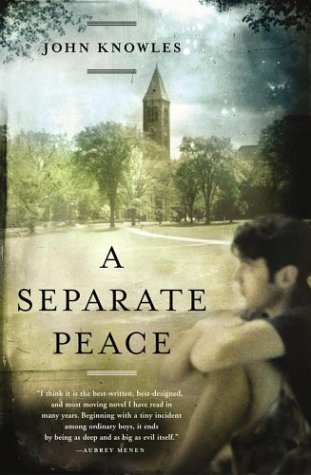All Nonfiction
- Bullying
- Books
- Academic
- Author Interviews
- Celebrity interviews
- College Articles
- College Essays
- Educator of the Year
- Heroes
- Interviews
- Memoir
- Personal Experience
- Sports
- Travel & Culture
All Opinions
- Bullying
- Current Events / Politics
- Discrimination
- Drugs / Alcohol / Smoking
- Entertainment / Celebrities
- Environment
- Love / Relationships
- Movies / Music / TV
- Pop Culture / Trends
- School / College
- Social Issues / Civics
- Spirituality / Religion
- Sports / Hobbies
All Hot Topics
- Bullying
- Community Service
- Environment
- Health
- Letters to the Editor
- Pride & Prejudice
- What Matters
- Back
Summer Guide
- Program Links
- Program Reviews
- Back
College Guide
- College Links
- College Reviews
- College Essays
- College Articles
- Back
A Separate Peace by John Knowles
Friendship always has it’s ups and downs, especially for the characters in A Separate Peace. In the novel A Separate Peace Gene and Finny are best friends. However, as time and heartache loosen their friendship, they grow increasingly similar. In the novel A Separate Peace, Gene grows to be like Finny by his constant competition and envy of Finny, Finny's prompts for Gene to become more like him, and Gene's loyalty toward Finny and their friendship.
Throughout the novel, Gene expresses his disdain for Finny’s ability to be great at everything, which shows how envious of Finny he really is. This is in the very first part of the story when Gene says “I was beginning to see that Phineas could get away with anything. I couldn’t help envying him that a little, which was perfectly normal.” (Knowles 25) Gene tries to justify his feeling of envy by commenting on how jealousy is normal, especially with a close friend. Even though he tries to justify his feeling, it only convinces the reader more of his envy. Gene also always wants to be on the same level as Finny. He knows he cannot compete with him in sports, but excels in academics, which gives him a sense of authority over Finny in that area. This is seen when Gene thinks to himself “If I was head of the class and won that prize we would be even…” (52). If Gene was a true friend to Finny, he wouldn’t feel the need to be greater than him. Gene was not the only one who caused their friendship to end, but Finny did as well.
After his accident, Finny begins to realize that he cannot be the person he once was, and urges Gene to fill in the gaps. This is most evident when Finny claims there is no war, and that Gene should train for the 1944 Olympics. Finny says “Listen pal, if I can’t play sports, you’re going to play them for me” (85), to which Gene agrees. Gene tries to justify that it’s to spare Finny of the reality of war, but it is obvious that he is too fearful of losing their friendship, a friendship that now defines him, so much so he won’t reveal the reality of war to Finny. Gene begins to fall into his role, being defined as Finny’s friend makes him ultimately loose himself as an individual. Gene says, “This must have been my purpose from the first: to become a part of Phineas” (85). This shows that he feels like a part of his friend, instead of his own person.
Despite his growing sense of jealousy, Gene remains loyal to their friendship, as if letting go of Finny is letting go of himself. He contemplates going to war with Brinker after Finny leaves to Boston for his leg, but does not go to stay with Finny. Gene says “The war then passed away from me, and dreams of enlistment and escape and a clean start lost their meaning for me” (108). He says this after seeing that Finny was reliant on him, almost as much as he relied on Finny. Also seen is their devotion to salvaging their friendship when Finny is in the hospital after falling down the stairs, and Gene apologizes. After much thought, Finny accepts that Gene was the one who pushed him out of the tree, and forgives Gene before his death.
Although they put on a show of an everlasting friendship, Finny and Gene couldn’t uphold their high expectations of the other. Finny tried to control Gene, and Gene was trying to be Finny. This eventually becomes a competition between the friends. Finny was stuck in a perfect world where his friend would never hurt him, even though he ultimately did. Even though they tried to savor what they could of their partnership, in the end it leads to Finny’s death. Gene strayed from being himself, and it hurt everyone in the end.
Similar Articles
JOIN THE DISCUSSION
This article has 0 comments.

